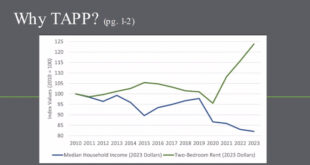Mill Levy cap upheld as legal
By Alissa Johnson
A series of disputes and lawsuits between landowners, a developer, and government entities regarding a mill levy that exceeded its cap in Mt. Crested Butte—as well as issues over who would pay for infrastructure costs in the Prospect subdivision—are in the process of being resolved. A court ruling has also found that exceeding the cap was illegal.
At the heart of the dispute is a mill levy enacted by Reserve Metro District #2, the financing district in Prospect that exceeded a mill levy cap outlined in its service agreement with the town of Mt. Crested Butte. Capped at 50 mills, District #2 originally surpassed that limit to cover legal and administrative costs when property owners took over its board after a 2012 election. Because property values fell during the recession, the entire 50 mill levy was required to service debt for an existing loan to pay for infrastructure. An additional 3 mills was used to hire an attorney.
Over time, the mill levy for District #2 grew to as much as 115 mills. Fifty mills covered the bond and the remaining portion covered the costs associated with ensuing legal disputes over the legality of exceeding the cap and whether the district or the developer (a branch of Crested Butte Mountain Resort) ought to ultimately pay for infrastructure.
A significant piece of the legal picture between the two districts seems to be becoming clearer as a settlement is on the table between major players in the dispute.
Specifically, a conceptual agreement has been reached regarding a lawsuit originally filed in February 2013 by Reserve Metro District #1 (the service district responsible for management and operations in Prospect) and the town of Mt. Crested Butte against Reserve Metro District #2 and Gunnison County for exceeding the mill levy cap. That led to countersuits by District #2, and the remaining claims were scheduled to go to trial on Monday, November 2.
But at a November 3 Mt. Crested Town Council meeting, town attorney Kathy Fogo told the council that a likely settlement had been reached over the weekend.
“The case has been continued to February 16 if necessary, but there is a slightly better than conceptual settlement in place to which all parties agree. Now it’s just a matter of fine-tuning it, getting it all in written form, and figuring out the mechanics,” she said.
According to Michael Kraatz, president of Reserve Metro District #1, that agreement is moving forward.
“Both boards [of Districts #1 and #2] had separate meetings and ratified the terms sheet for the settlement. What will happen now is the attorneys will work out the detailed settlement agreement for that. That has yet to occur but will happen pretty quickly,” Kraatz said.
Around the same time, the Colorado Court of Appeals issued a November 5 decision in a separate case and ruled that exceeding the mill levy cap was in fact illegal (the developer had filed an appeal of property taxes levied as a result of violating the cap). In addition, the court found that any property owner in Prospect can file for an abatement.
“That was great news for the developer group and the property owners in Prospect because it ruled that 50 mills was a valid cap,” Kraatz said.
David Clayton, mayor of Mt. Crested Butte, said that decision upholds the process in place. “It’s basically saying if they want to change the service agreement, they have to go through the process stipulated,” he said.
Next, the terms of the settlement could require a modification of the service plan and will go to the town of Mt. Crested Butte and Gunnison County for approval. And according to Clayton, District #2 will have until December 15 to certify a mill levy rate to be included in the tax bill for next year.
 The Crested Butte News Serving the Gunnison Valley since 1999
The Crested Butte News Serving the Gunnison Valley since 1999



